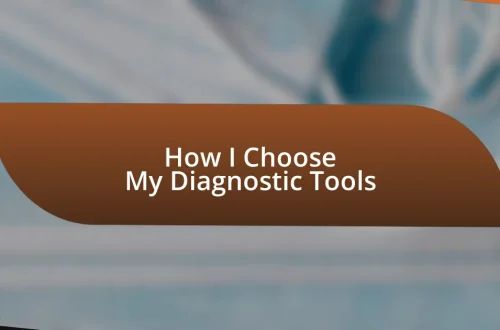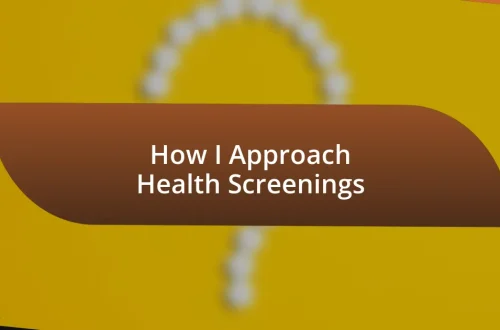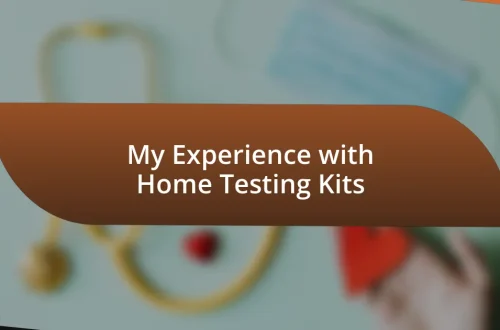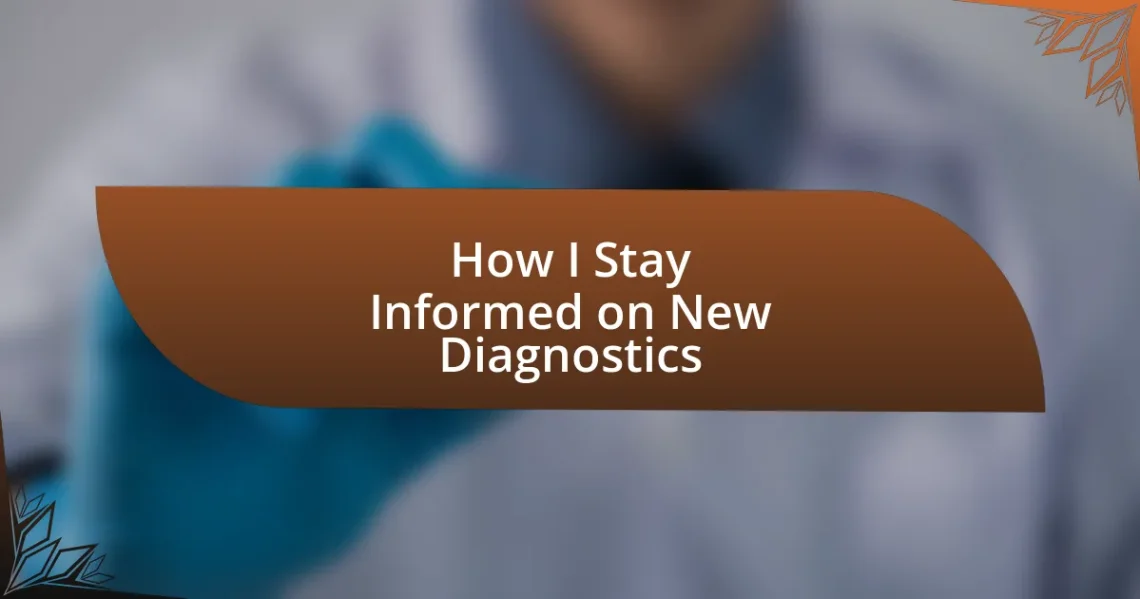
How I Stay Informed on New Diagnostics
Key takeaways:
- Early and accurate diagnostics are essential for effective treatment and patient peace of mind.
- Reliable information sources are crucial; look for author credentials, publication reputation, and recent content.
- Engagement in professional journals, online communities, and conferences significantly enhances knowledge and networking opportunities.
- Implementing a continuous learning strategy, incorporating diverse methods, is vital for staying updated in the fast-evolving field of diagnostics.
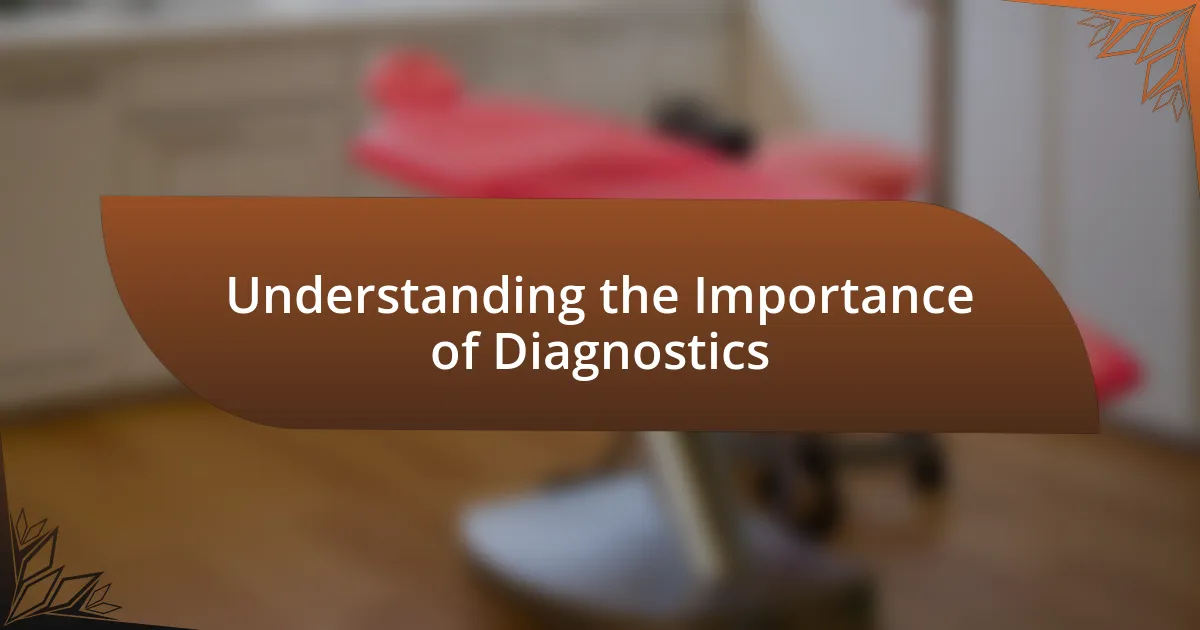
Understanding the Importance of Diagnostics
Diagnostics play a crucial role in identifying health issues early on. I remember a time when a routine check revealed a condition I hadn’t even suspected. That experience opened my eyes to how vital early detection can be.
When a diagnosis is precise, treatment becomes more effective. Think about it: wouldn’t you want to know exactly what you’re facing rather than guessing in the dark? I’ve learned that a clear diagnosis can provide peace of mind, allowing patients to focus on recovery rather than uncertainty.
Moreover, diagnostics are constantly evolving, incorporating new technologies and methodologies. Each advancement has the potential to change lives, and staying informed about these developments is essential. Personally, I find it exciting to think about the future of diagnostics and how it might improve outcomes for patients everywhere.
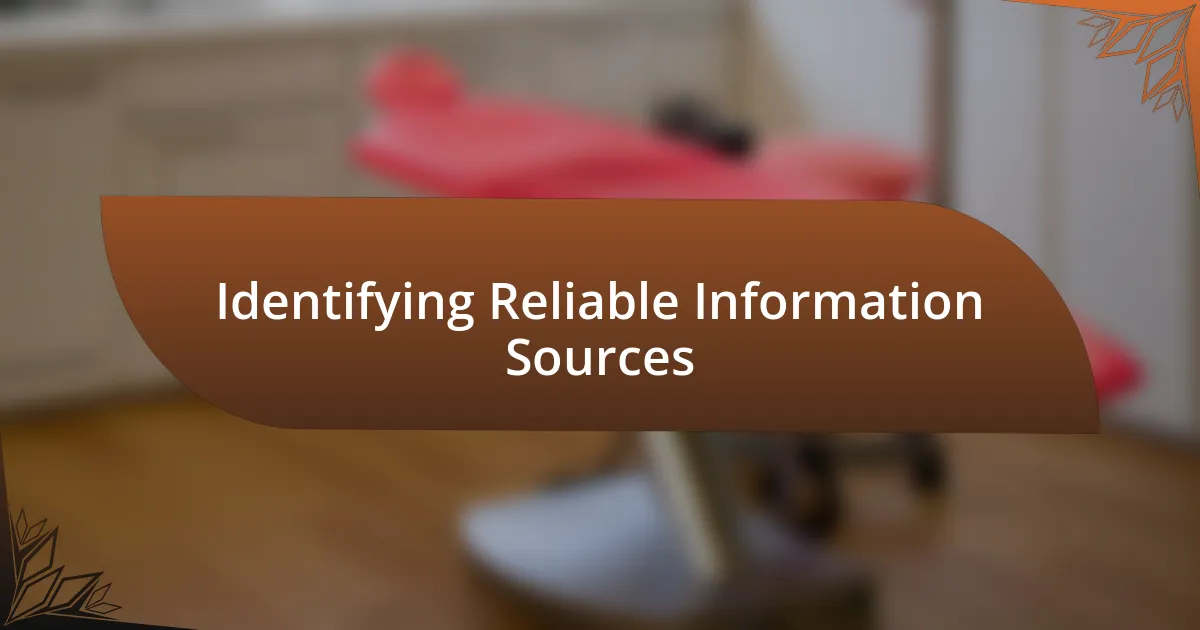
Identifying Reliable Information Sources
Finding reliable information sources is crucial in the rapidly evolving field of diagnostics. I often reflect on the importance of discerning credible data. A few years ago, I stumbled upon a seemingly reputable website that shared articles filled with outdated information—this experience taught me that not all sources are equal. Engaging with trustworthy sources helps me avoid misinformation and make informed decisions.
Here are some key indicators to help identify reliable information sources:
- Author Credentials: Check the authors’ qualifications and expertise in the field.
- Publication Reputation: Rely on well-known journals or organizations with a strong track record in diagnostics.
- Citations and References: Examine if the information is backed by research and cites credible studies.
- Date of Publication: Ensure the content is recent, as advancements can happen rapidly.
- Peer Review Process: Preference should be given to articles that have undergone peer review, ensuring a level of scrutiny and integrity.
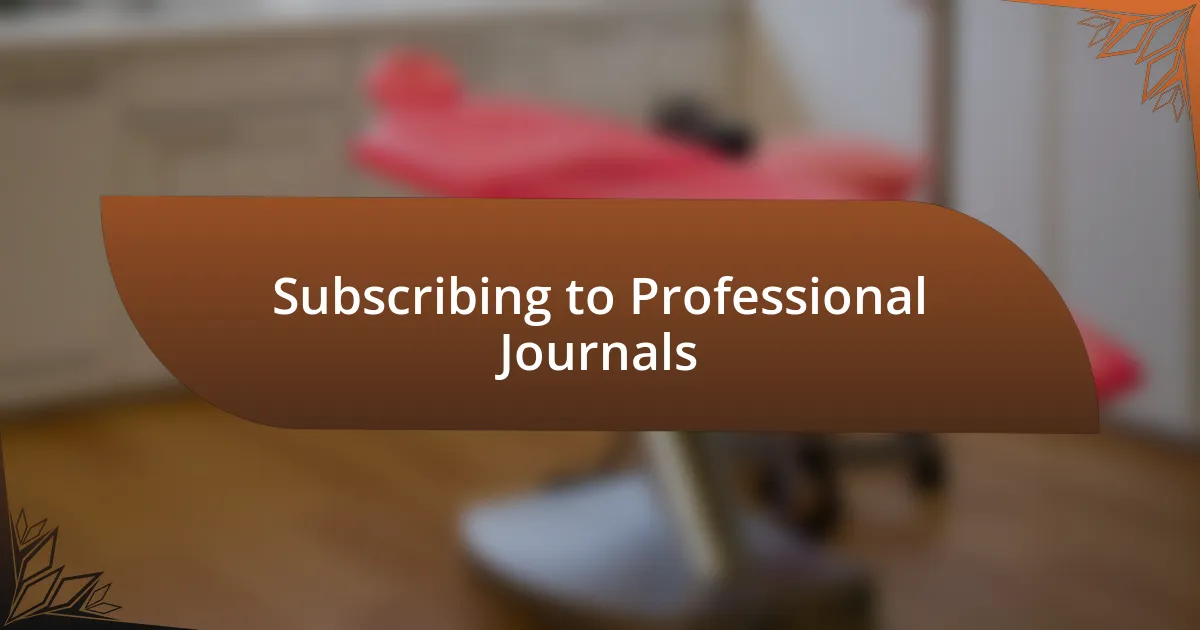
Subscribing to Professional Journals
Subscribing to professional journals has been one of the most effective ways for me to stay in tune with the latest diagnostic advancements. I remember the excitement when I first received my subscription to a leading diagnostic journal; it felt like opening a door to a treasure trove of cutting-edge research. Each issue not only expands my knowledge but also offers insights from experts in the field, which can be incredibly enriching.
What truly amazes me is how professional journals keep pace with the rapid changes in diagnostics. For instance, when the COVID-19 pandemic emerged, I found numerous articles covering innovative diagnostic tools and methodologies that were evolving almost daily. This timely information allows me to stay ahead in my field, ensuring that I can make informed decisions based on the latest evidence.
In my experience, the beauty of these journals lies in their diversity. The depth of information is astounding—ranging from groundbreaking clinical trials to expert reviews and discussions about future trends. Reflecting on this, I often wonder how else I could access such high-quality information without my journal subscriptions. They truly serve as an essential resource in my ongoing learning journey.
| Journal Attributes | Personal Experience |
|---|---|
| Author Expertise | Insights from industry leaders enhance learning. |
| Frequency of Publication | Regular updates keep my knowledge current. |
| Peer Review Status | Ensures credibility and trust in the information. |
| Scope of Topics | Diverse articles range from practical to theoretical insights. |
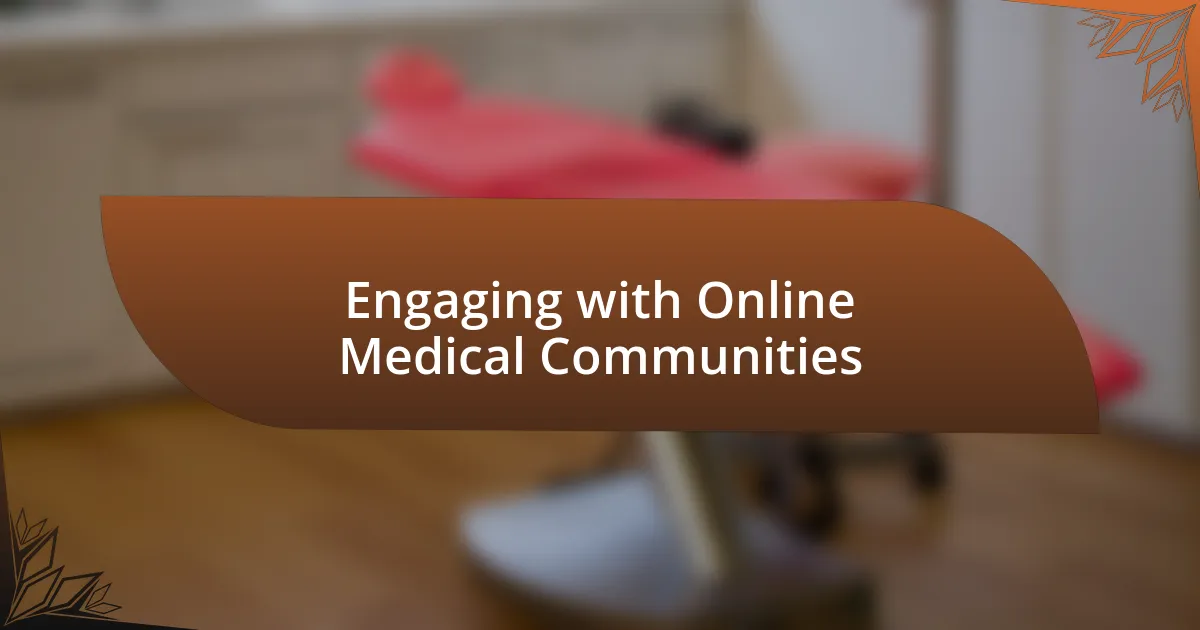
Engaging with Online Medical Communities
Engaging with online medical communities has been an eye-opening experience for me. I remember joining a forum dedicated to diagnostics and feeling immediately welcomed by like-minded professionals who share the same passion for learning. It’s fascinating how these platforms foster real-time discussions, where questions can be posed and answered almost instantaneously, creating a dynamic exchange of knowledge.
The sense of camaraderie among members stands out as one of the most rewarding aspects. I often find myself diving into threads that discuss recent breakthroughs or tricky cases that challenge our diagnostic skills. These conversations can evoke a mix of excitement and curiosity, prompting me to consider new perspectives and methodologies I hadn’t thought of before. Have you ever felt that surge of inspiration from a colleague’s experience? I certainly have—it’s like a spark that reignites my passion for the field.
One of the most compelling features of these online communities is the ability to network with experts from various specialties. Recently, I connected with a diagnostic radiologist who shared their insights on the latest imaging techniques. The depth of knowledge I’ve encountered in these discussions has enriched my professional growth immensely. I can’t help but wonder—how much can we learn from each other if we actively engage? Clearly, the possibilities are endless.
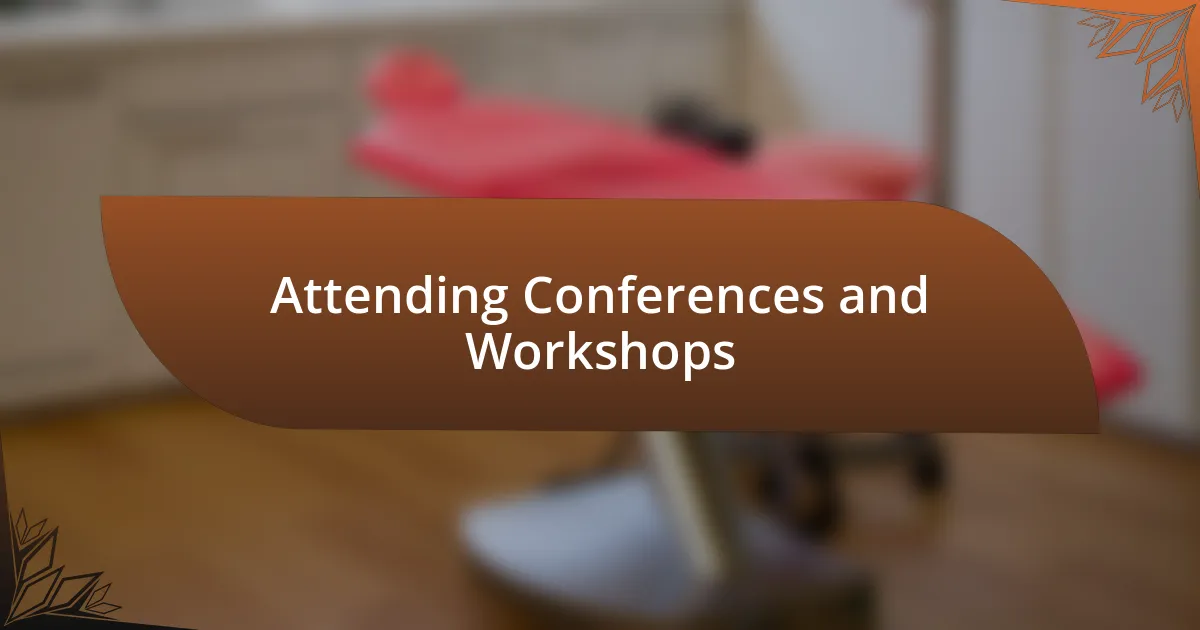
Attending Conferences and Workshops
Attending conferences and workshops has consistently been a cornerstone of my professional development. I still remember my first national conference: surrounded by industry leaders, I felt both exhilarated and intimidated. It was enlightening to hear firsthand about innovative diagnostic methods and emerging technologies that could reshape our practice. Have you ever experienced that electric atmosphere of ideas buzzing all around you? It’s truly invigorating.
One experience that stands out is a workshop I attended on precision medicine. The hands-on sessions allowed me to engage directly with novel diagnostic tools, and I left feeling not just informed, but inspired. There’s something about being in the same room with experts who share their genuine passion that can reignite your own motivation. I felt like I was part of a family of professionals all working toward the same goal—improving patient outcomes.
Moreover, the networking opportunities are invaluable. I recall striking up a conversation with a fellow attendee over lunch, which ultimately led to a collaborative project that has since transformed my approach to diagnostics. These connections often lead to meaningful partnerships that extend well beyond the event. How often do we get the chance to exchange ideas face-to-face with those shaping the future of our field? It’s an opportunity I make sure to seize every time.
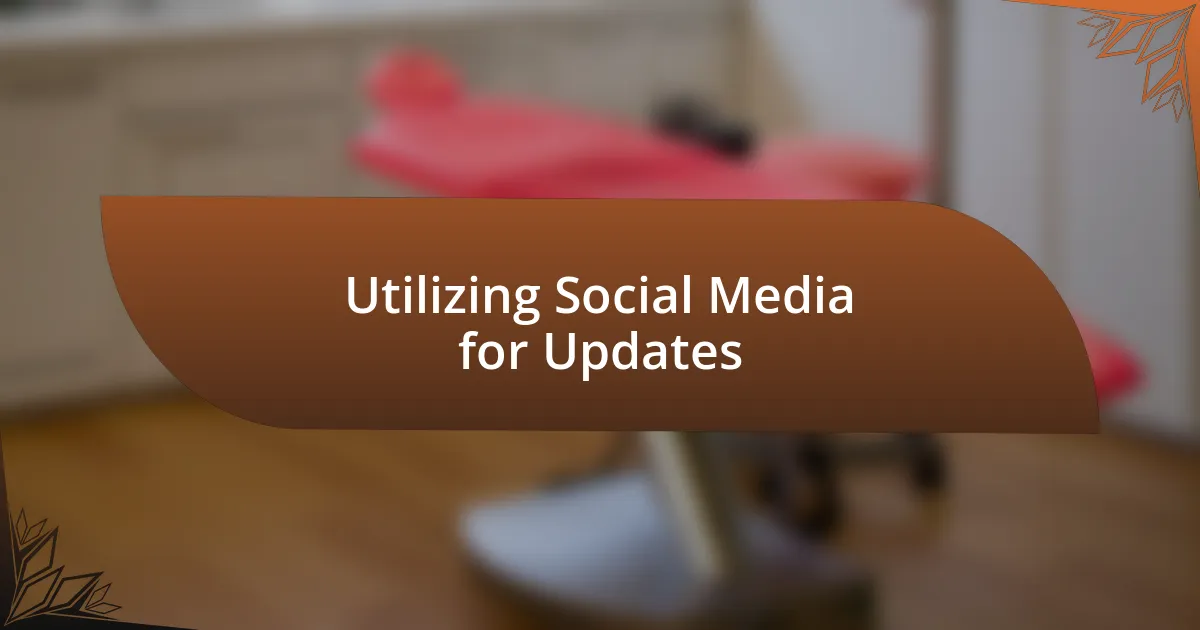
Utilizing Social Media for Updates
Social media has become an indispensable tool for staying updated on the latest diagnostics trends. I often find myself scrolling through Twitter feeds or LinkedIn updates during my morning coffee, discovering real-time insights shared by leading experts in the field. Have you noticed how some posts can spark a whole conversation, revealing innovative techniques or studies that you might not come across in traditional literature?
One time, I stumbled upon a webinar hosted on Instagram about cutting-edge diagnostic technologies. I was captivated by the host’s enthusiasm and the interactive nature of the platform. Participating in the comments made me feel like I was right there in a discussion circle with peers, allowing me to ask questions and share my thoughts in a way that felt personal and engaging. How refreshing is it to connect directly with the voices behind the research?
Moreover, I’ve joined several professional groups on Facebook where members regularly exchange articles, case studies, and experiences related to diagnostic advancements. These communities often feel like a supportive network where I can seek advice and share my own insights. Just last week, I shared a link about a breakthrough in biomarker testing, and the discussion that followed was a wealth of knowledge—proof that collaboration and shared experiences can enhance our understanding far beyond what we could learn in isolation.
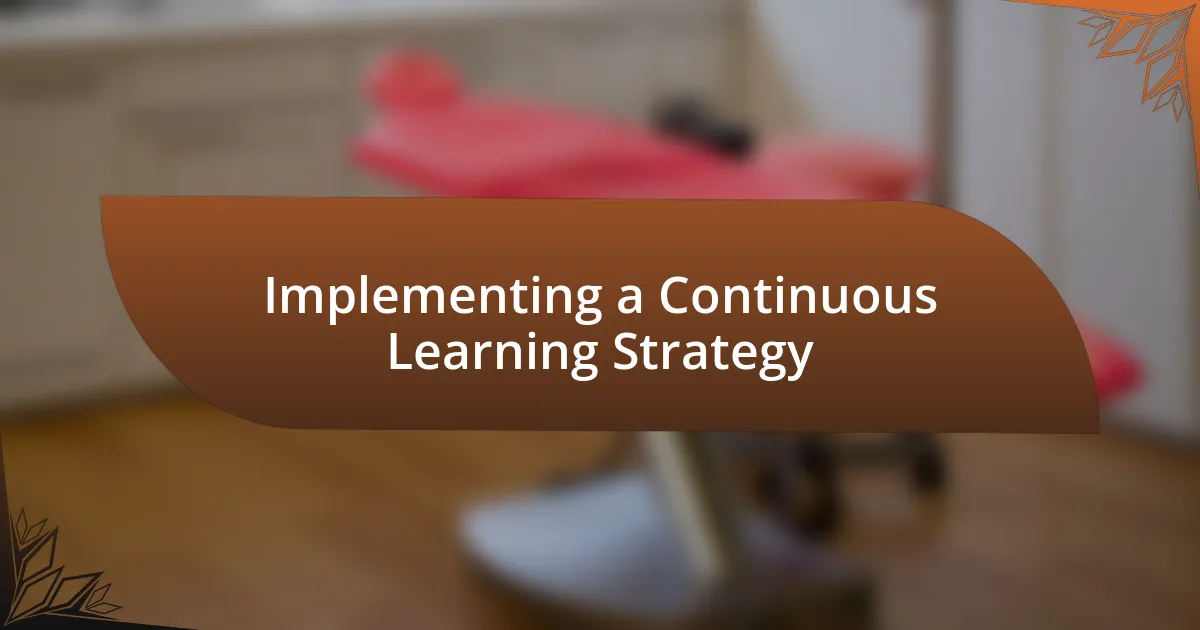
Implementing a Continuous Learning Strategy
Developing a continuous learning strategy is crucial for anyone aiming to keep pace with advancements in diagnostics. For me, this means dedicating specific time each week to review recent publications and research papers. I remember a period when I set aside Thursday afternoons for this purpose, transforming it into a mini “research retreat.” It’s amazing how breaking away from daily tasks can lead to unexpected insights.
Moreover, I find that blending different learning methods significantly enhances my understanding. Attending workshops and conferences not only enables me to gather new information but also allows me to network with professionals who share similar interests. One memorable experience was a workshop where I not only learned about emerging diagnostic tools but also engaged in hands-on activities that brought concepts to life. Have you ever had a workshop experience that changed your perspective on a topic?
Incorporating these strategies creates a rich, multifaceted learning environment. I continually reassess and adapt my approach, making tweaks based on what resonates most with me. Recently, I started using online courses that focus on niche areas of diagnostics, and it felt empowering to enhance my skills this way. How do you ensure you’re not just passively consuming information but actively engaging with it on a deeper level?


